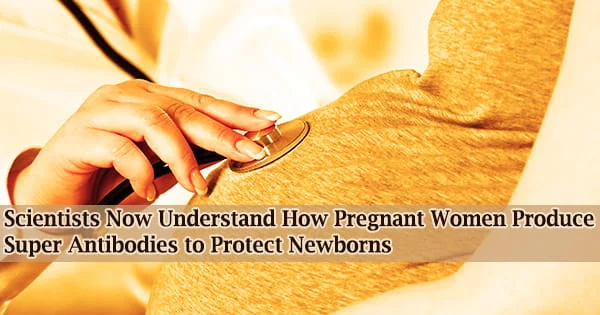In order to withstand the onslaught of infections that start invading newborn infants’ bodies as soon as they are born, scientists long ago found that newborn infants depend on immunological components transferred from their mothers.
Children eventually build their own immune systems, which are bolstered by a phalanx of well-recognized childhood immunizations, and which are formed through surviving natural exposures to viruses and bacteria. But in the interim, one of a mother’s most valuable gifts antibodies keeps her children safe.
Now, a comprehensive study that was released on June 8, 2022, in Nature offers a startling explanation of how those early stages of mother-provided immunity truly work. This discovery could imply that a wide spectrum of infectious diseases can be prevented from causing death and disability.
The results imply that scientists may be able to imitate the heightened antibodies that expectant moms produce in order to produce both novel medications to cure diseases and improved vaccines to prevent them.
“For many years, scientists believed that antibodies cannot get inside cells. They don’t have the necessary machinery. And so, infections caused by pathogens that live exclusively inside cells were thought to be invisible to antibody-based therapies,” says Sing Sing Way, MD, PhD, Division of Infectious Diseases at Cincinnati Children’s.
“Our findings show that pregnancy changes the structure of certain sugars attached to the antibodies, which allows them to protect babies from infection by a much wider range of pathogens.”
“The maternal-infant dyad is so special. It’s the intimate connection between a mother and her baby,” says John Erickson, MD, PhD, Division of Neonatology, and first author of the study.
The Cincinnati Children’s Center for Inflammation and Tolerance and the Perinatal Institute, which works to improve outcomes for all expectant mothers and their unborn children, include Way and Erickson.
Erickson continues, “This special connection starts when babies are in the womb and continues after birth. I love seeing the closeness between mothers and their babies in our newborn care units. This discovery paves the way for pioneering new therapies that can specifically target infections in pregnant mothers and newborn babies. I believe these findings also will have far-reaching implications for antibody-based therapies in other fields.”
For many years, scientists believed that antibodies cannot get inside cells. They don’t have the necessary machinery. And so, infections caused by pathogens that live exclusively inside cells were thought to be invisible to antibody-based therapies.
Sing Sing Way
How mothers make super antibodies
The current study pinpoints which specific sugar is altered during pregnancy, along with the manner and timing of the alteration. Sialic acid, one of the sugars linked to antibodies, changes from its “acetylated” form to its “deacetylated” form during pregnancy.
Immunoglobulin G (IgG), the most prevalent kind of antibody in the body, can now play a wider range of protective roles by enhancing immunity by activating receptors that only react to deacetylated sugars.
“This change is the light switch that allows maternal antibodies to protect babies against infection inside cells,” Way says.
“Mothers always seem to know best,” Erickson adds.
Revved-up antibodies can be produced in the lab
The research team identified the main biochemical variations between antibodies in virgin mice compared to pregnant animals using cutting-edge mass spectrometry techniques and other methodologies. They also discovered the enzyme that is naturally expressed during pregnancy and is in charge of causing this change.
Additionally, by giving lab-grown supplies of the antibodies from healthy pregnant mice to pups born to moms who were gene-edited to lack the capacity to remove acetylation from antibodies to boost protection, the team was able to successfully restore lost immune protection.
Numerous monoclonal antibodies have been created as prospective treatments for a wide range of diseases, such as COVID-19, asthma, multiple sclerosis, cancer, and allergies as well as difficult-to-treat viral and bacterial infections.
Many more are undergoing clinical studies, some haven’t produced compelling results, and some have already received FDA approval. According to Way, it is possible to mimic the molecular changes in antibodies that take place during pregnancy in order to modify how antibodies stimulate the immune system and enhance their effects.
Improved treatments for infections brought on by other intracellular pathogens like HIV and respiratory syncytial virus (RSV), a widespread virus that poses major hazards to babies, may result from this.
Another reason to accelerate vaccine development
“We’ve known for years the many far-reaching benefits of breastfeeding,” Erickson says. “One major factor is the transfer of antibodies in breastmilk.”
According to the study, the molecular switch continues to exist in nursing moms, allowing for the transmission of antibodies with expanded protective properties to infants via breastmilk.
Way adds that the results highlight the significance of receiving all available vaccinations for women of reproductive age as well as the requirement for researchers to provide additional vaccines against illnesses that are particularly prevalent in pregnant women or in newborn babies.
“The immunity needs to exist within the mother for it to be transferred to her child,” Way says. “Without natural exposures or immunity primed by vaccination, when that light switch flips during pregnancy, there’s no electricity behind it.”
About the study
A patent on antibody sialic acid modification has been filed by Cincinnati Children’s Hospital with first author Erickson and senior author Way as inventors (PCT/US2022/018847).
In addition to Erickson and Way, the study in Nature was co-authored by 9 researchers at Cincinnati Children’s and the University of Cincinnati: Alexander Yarawsky, BS, Jeanette L.C. Miller, PhD, Tzu-Yu Shao, BS, Ashley Severance, PhD, Hilary Miller-Handley, MD, Yuehong Wu, MS, Giang Pham, PhD, Yueh-Chiang Hu, PhD, and Andrew Herr, PhD.
Contributors also included experts from the University of Georgia, the Ohio State University, Cornell University, and Roswell Park Comprehensive Cancer Center in Buffalo.





